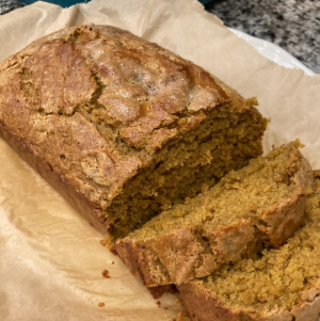
The Thanksgiving of 2018, I was on a liquid diet. I don’t mean smoothies and chicken stock. I mean an elemental diet. That’s a special liquid diet designed to give the large intestine a break. All of the nutrients in the syrupy sweet liquid are considered “predigested.” They’re absorbed into the walls of the small intestine so that no work needs to be done by the large intestine. So, the year of 2018, after not chewing food for two weeks, I sat and watched my family eat Thanksgiving dinner. Perhaps you can imagine my emotional state…my mental despair and pain. I’ll circle back to this event later as we consider thankfulness in the midst of pain.

My 2018 Thanksgiving dinner. I’ll never forget the sticky sweet taste of that elemental diet. I consumed it every three hours for over five weeks.
THANKFULNESS IS NOT MY DEFAULT SETTING
Thankfulness is not my default setting. It could just be my personality, but I think it’s pretty common to most people. When I’m in pain, severe chronic pain, my natural setting is one of self pity. I tend to wallow in comparative thoughts. “Why can’t my body be like everyone else’s?” Note: I mentally assume that everyone else is great, when statistically we know that fifty percent of Americans suffer from chronic illness. But when I’m in pain, it’s just me. The pain and despair are mine. The sense of hopelessness, also mine.
I don’t naturally gravitate to a sense of thanksgiving. My sinful nature leads me away from thankfulness. My sinful nature turns inward, to look only upon myself. But really, that’s what sin does to us all. Our preoccupation with ourselves is truly the root of sin. We want to be in control. We want the world to revolve around us, our needs, and our well-being. Because of sin, thankfulness is not our default setting. Thankfulness requires humility. It requires a factory reset, if you will. We have to remove ourselves from the center of the universe, and transfer our sense of self to the periphery.
“GRATITUDE”, “THANKSGIVING”, AND “FEAR NOT”
The word “gratitude” appears in the Bible 157 times. “Thanksgiving” or “thanks” appears 72 times. Together, that’s 229 times that the emotional state of our heart is referenced. “Fear not” appears in the Bible, a whopping 365 times. These words are all related. They’re not insignificant.
In our natural state, when we turn inward, we are in fact turning away from God. Maybe we do that because of self pity, or self loathing. Maybe we do it because we’re angry. I think God, the author and perfecter of our faith, knows that often, we turn inward because we’re afraid. We’re afraid that our pain will never come to an end. We’re afraid that everyone else will somehow have a better, more blessed life than our own. We get stuck in comparative thoughts. We put ourselves in the center of the circle and sling all of creation around our own sense of well-being. Our emotions rule the day.
But 229 times, God reminds us to rest in a spirit of gratefulness. He reminds us to find a sense of thankfulness, even amidst the pain.
Rejoice always, pray without ceasing, give thanks in all circumstances; for this is the will of God in Christ Jesus for you.
1 Thessalonians 5:16-18
We can’t rejoice in times of pain if we’re looking inward. God tells us where to turn our attention when he says, “pray without ceasing.” We’re to turn to God our Father. We’re to give thanks, no matter the circumstances. In pain. In fear. From moments of deep anxiety. We’re to go to God in prayer.
The Lord is near to the brokenhearted and saves the crushed in spirit.
Psalm 34:18
THANKFULNESS IN THE MIDST OF PAIN

Let’s go back to 2018. I’m not going to tell you that I did a perfect job of finding thankfulness in the midst of pain. I sat at the table while everyone else ate my favorite foods. When the meal was over, I went up to a dark room and cried. I do have a journal entry from that day, though. I recorded: “I’m thankful for my family. I’m thankful that I was present at the table today, and not in a hospital bed.” (I’d been hospitalized for twelve days earlier that year.)
Sometimes it’s really, really hard to feel thankful. But thankfulness is not just a feeling or emotion. It’s a state of being. We can ask the Lord to point our hearts toward thankfulness even when we don’t feel it naturally. The truth is, even at our worst, we can be thankful for the salvation we have in Jesus Christ. Grace is ours. Forgiveness is ours. We are loved. We are known. No matter the circumstances, God is with us. He is for us. There’s no comparison in which someone has more love from the Father than he has given me. Even in pain, I am his.
GOD’S DEFAULT SETTING
In his letter to the church at Philippi, Paul writes in chapter 4: 12-13, “I know how to be brought low, and I know how to abound. In any and every circumstance, I have learned the secret of facing plenty and hunger, abundance and need. I can do all things through him who strengthens me.”
That God-given strength includes our ability to profess thankfulness. We can turn to God and thank him, even in pain, because he gives us the strength to stand in our weakness and look to him with hope and gratitude. And maybe it’s through our pain that we see the character of God. His default setting is love. Grace. Forgiveness. As our default state looks inward, his heart radiates outward toward us. For that, I am ever thankful.







Leave a Reply
You must be logged in to post a comment.